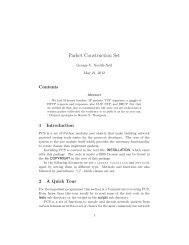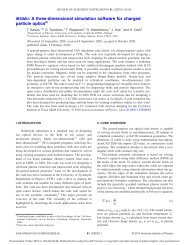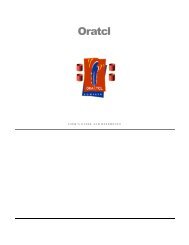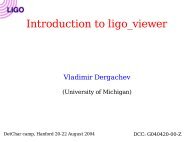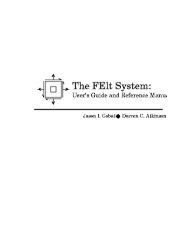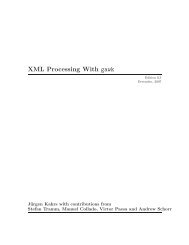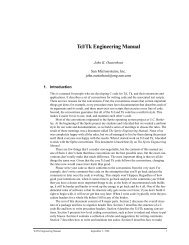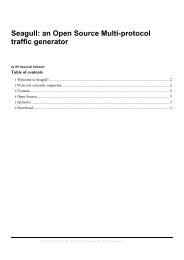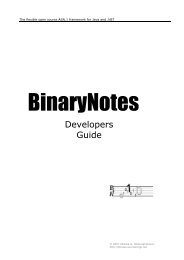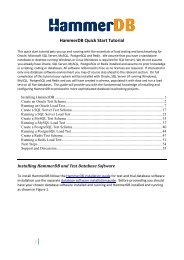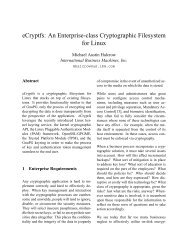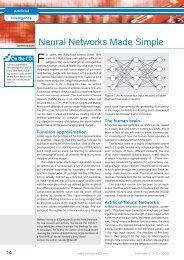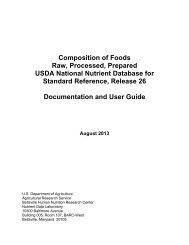libSRTP 1.4.3 Overview and Reference Manual - SourceForge
libSRTP 1.4.3 Overview and Reference Manual - SourceForge
libSRTP 1.4.3 Overview and Reference Manual - SourceForge
Create successful ePaper yourself
Turn your PDF publications into a flip-book with our unique Google optimized e-Paper software.
<strong>libSRTP</strong><br />
1.5 Secure RTP Background<br />
[sh1]$ test/rtpw -s -k $k -ea 0.0.0.0 9999<br />
Security services: confidentiality message authentication<br />
set master key/salt to C1EEC3717DA76195BB878578790AF71C/4EE9F859E197A414A78D5ABC7451<br />
setting SSRC to 2078917053<br />
sending word: A<br />
sending word: a<br />
sending word: aa<br />
sending word: aal<br />
sending word: aalii<br />
sending word: aam<br />
sending word: Aani<br />
sending word: aardvark<br />
...<br />
[sh2] set k=c1eec3717da76195bb878578790af71c4ee9f859e197a414a78d5abc7451<br />
[sh2]$ test/rtpw -r -k $k -ea 0.0.0.0 9999<br />
security services: confidentiality message authentication<br />
set master key/salt to C1EEC3717DA76195BB878578790AF71C/4EE9F859E197A414A78D5ABC7451<br />
19 octets received from SSRC 2078917053 word: A<br />
19 octets received from SSRC 2078917053 word: a<br />
20 octets received from SSRC 2078917053 word: aa<br />
21 octets received from SSRC 2078917053 word: aal<br />
...<br />
1.5 Secure RTP Background<br />
In this section we review SRTP <strong>and</strong> introduce some terms that are used in <strong>libSRTP</strong>. An RTP session is defined by a<br />
pair of destination transport addresses, that is, a network address plus a pair of UDP ports for RTP <strong>and</strong> RTCP. RTCP,<br />
the RTP control protocol, is used to coordinate between the participants in an RTP session, e.g. to provide feedback<br />
from receivers to senders. An SRTP session is similarly defined; it is just an RTP session for which the SRTP profile is<br />
being used. An SRTP session consists of the traffic sent to the SRTP or SRTCP destination transport addresses. Each<br />
participant in a session is identified by a synchronization source (SSRC) identifier. Some participants may not send<br />
any SRTP traffic; they are called receivers, even though they send out SRTCP traffic, such as receiver reports.<br />
RTP allows multiple sources to send RTP <strong>and</strong> RTCP traffic during the same session. The synchronization source<br />
identifier (SSRC) is used to distinguish these sources. In <strong>libSRTP</strong>, we call the SRTP <strong>and</strong> SRTCP traffic from a<br />
particular source a stream. Each stream has its own SSRC, sequence number, rollover counter, <strong>and</strong> other data. A<br />
particular choice of options, cryptographic mechanisms, <strong>and</strong> keys is called a policy. Each stream within a session can<br />
have a distinct policy applied to it. A session policy is a collection of stream policies.<br />
A single policy can be used for all of the streams in a given session, though the case in which a single key is shared<br />
across multiple streams requires care. When key sharing is used, the SSRC values that identify the streams must<br />
5



